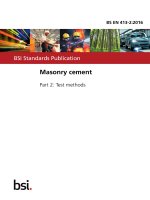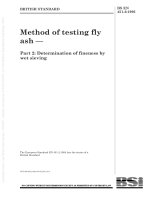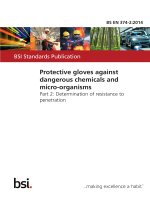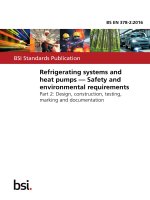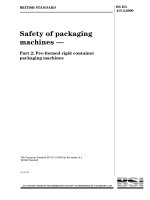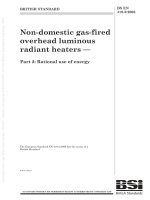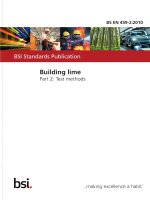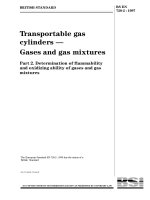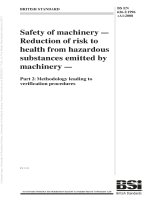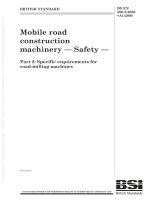Bsi bs en 61058 2 6 2016
Bạn đang xem bản rút gọn của tài liệu. Xem và tải ngay bản đầy đủ của tài liệu tại đây (2.07 MB, 24 trang )
BS EN 61058-2-6:2016
BSI Standards Publication
Switches for appliances
Part 2-6: Particular requirements for
switches used in electric motor-operated
hand-held tools, transportable tools and
lawn and garden machinery
BRITISH STANDARD
BS EN 61058-2-6:2016
National foreword
This British Standard is the UK implementation of EN 61058-2-6:2016. It is
identical to IEC 61058-2-6:2016.
The UK participation in its preparation was entrusted to Technical
Committee PEL/23, Electrical accessories.
A list of organizations represented on this committee can be obtained on
request to its secretary.
This publication does not purport to include all the necessary provisions of
a contract. Users are responsible for its correct application.
© The British Standards Institution 2016.
Published by BSI Standards Limited 2016
ISBN 978 0 580 89969 0
ICS 29.120.40
Compliance with a British Standard cannot confer immunity from
legal obligations.
This British Standard was published under the authority of the
Standards Policy and Strategy Committee on 30 November 2016.
Amendments/corrigenda issued since publication
Date
Text affected
BS EN 61058-2-6:2016
EUROPEAN STANDARD
EN 61058-2-6
NORME EUROPÉENNE
EUROPÄISCHE NORM
October 2016
ICS 29.120.40
English Version
Switches for appliances - Part 2-6: Particular requirements for
switches used in electric motor-operated hand-held tools,
transportable tools and lawn and garden machinery
(IEC 61058-2-6:2016)
Interrupteurs pour appareils - Partie 2-6: Exigences
particulières pour les interrupteurs utilisés sur les outils
électroportatifs à moteur, les outils portables et les
machines pour jardins et pelouses
(IEC 61058-2-6:2016)
Geräteschalter - Teil 2-6: Besondere Anforderungen für
Schalter zur Anwendung in elektromotorisch betätigten
handgeführten Werkzeugen, transportablen Werkzeugen
und Rasen- und Gartenmaschinen
(IEC 61058-2-6:2016)
This European Standard was approved by CENELEC on 2016-07-20. CENELEC members are bound to comply with the CEN/CENELEC
Internal Regulations which stipulate the conditions for giving this European Standard the status of a national standard without any alteration.
Up-to-date lists and bibliographical references concerning such national standards may be obtained on application to the CEN-CENELEC
Management Centre or to any CENELEC member.
This European Standard exists in three official versions (English, French, German). A version in any other language made by translation
under the responsibility of a CENELEC member into its own language and notified to the CEN-CENELEC Management Centre has the
same status as the official versions.
CENELEC members are the national electrotechnical committees of Austria, Belgium, Bulgaria, Croatia, Cyprus, the Czech Republic,
Denmark, Estonia, Finland, Former Yugoslav Republic of Macedonia, France, Germany, Greece, Hungary, Iceland, Ireland, Italy, Latvia,
Lithuania, Luxembourg, Malta, the Netherlands, Norway, Poland, Portugal, Romania, Slovakia, Slovenia, Spain, Sweden, Switzerland,
Turkey and the United Kingdom.
European Committee for Electrotechnical Standardization
Comité Européen de Normalisation Electrotechnique
Europäisches Komitee für Elektrotechnische Normung
CEN-CENELEC Management Centre: Avenue Marnix 17, B-1000 Brussels
© 2016 CENELEC All rights of exploitation in any form and by any means reserved worldwide for CENELEC Members.
Ref. No. EN 61058-2-6:2016 E
BS EN 61058-2-6:2016
EN 61058-2-6:2016
European foreword
The text of document 23J/402/FDIS, future edition 1 of IEC 61058-2-6, prepared by SC 23J “Switches
for appliances” of IEC/TC 23 “Electrical accessories” was submitted to the IEC-CENELEC parallel vote
and approved by CENELEC as EN 61058-2-6:2016.
The following dates are fixed:
•
latest date by which the document has to be
implemented at national level by
publication of an identical national
standard or by endorsement
(dop)
2017-04-21
•
latest date by which the national
standards conflicting with the
document have to be withdrawn
(dow)
2019-10-21
Attention is drawn to the possibility that some of the elements of this document may be the subject of
patent rights. CENELEC [and/or CEN] shall not be held responsible for identifying any or all such
patent rights.
Endorsement notice
The text of the International Standard IEC 61058-2-6:2016 was approved by CENELEC as a
European Standard without any modification.
The Bibliography EN 61058-1:2002 applies, except as follows:
In the Bibliography of EN 61058-1:2002, the following notes have to be added for the standards
indicated:
1)
2
1)
IEC 60745-1
NOTE
Harmonized as EN 60745-1 .
IEC 62841-1
NOTE
Harmonized as EN 62841-1.
The latest edition is superseded by EN 62841-1:2015.
BS EN 61058-2-6:2016
EN 61058-2-6:2016
Annex ZA
(normative)
Normative references to international publications
with their corresponding European publications
Annex ZB of EN 61058-1:2002 applies.
3
–2–
BS EN 61058-2-6:2016
IEC 61058-2-6:2016 © IEC 2016
CONTENTS
FOREWORD ........................................................................................................................3
1
Scope ...........................................................................................................................5
2
Normative references ....................................................................................................5
3
Definitions .....................................................................................................................5
4
General requirements ....................................................................................................5
5
General notes on tests ..................................................................................................5
6
Rating ...........................................................................................................................5
7
Classification .................................................................................................................5
8
Marking and documentation ...........................................................................................6
9
Protection against electric shock....................................................................................6
10
Provision for earthing ....................................................................................................7
11
Terminals and terminations ............................................................................................7
12
Construction ..................................................................................................................9
13
Mechanism ....................................................................................................................9
14
Protection against solid objects, ingress of water and humid conditions ..........................9
15
Insulation resistance and dielectric strength ...................................................................9
16
Heating ....................................................................................................................... 10
17
Endurance ................................................................................................................... 10
18
Mechanical strength .................................................................................................... 14
19
Screws, current-carrying parts and connections ........................................................... 14
20
Clearances, creepage distances, solid insulation and coatings of rigid printed
board assemblies ........................................................................................................ 14
21
Fire hazard .................................................................................................................. 14
22
Resistance to rusting ................................................................................................... 15
23
Abnormal operation and fault conditions for electronic switches ................................... 15
24
Components for electronic switches ............................................................................. 16
25
EMC requirements ....................................................................................................... 16
Annexes ............................................................................................................................. 17
Annex F (informative) Switch application guide .................................................................. 17
Annex H (informative) Flat quick-connect terminations, method for selection of
female connectors .............................................................................................................. 17
Annex N (normative) Altitude correction factors .................................................................. 17
Annex U (normative) Dimensions of tabs forming part of a switch ....................................... 17
Annex V (informative) Requirements and tests for resistance to abnormal heat for
unattended appliances ........................................................................................................ 17
Bibliography ....................................................................................................................... 18
Table 3 – Switch information .................................................................................................6
Table 17 – Test loads for electrical endurance tests for a.c. circuits .................................... 12
Table 18 – Test loads for electrical endurance tests for d.c. circuits .................................... 12
BS EN 61058-2-6:2016
IEC 61058-2-6:2016 © IEC 2016
–3–
INTERNATIONAL ELECTROTECHNICAL COMMISSION
____________
SWITCHES FOR APPLIANCES –
Part 2-6: Particular requirements for switches used
in electric motor-operated hand-held tools, transportable
tools and lawn and garden machinery
FOREWORD
1) The International Electrotechnical Commission (IEC) is a worldwide organization for standardization comprising
all national electrotechnical committees (IEC National Committees). The object of IEC is to promote
international co-operation on all questions concerning standardization in the electrical and electronic fields. To
this end and in addition to other activities, IEC publishes International Standards, Technical Specifications,
Technical Reports, Publicly Available Specifications (PAS) and Guides (hereafter referred to as “IEC
Publication(s)”). Their preparation is entrusted to technical committees; any IEC National Committee interested
in the subject dealt with may participate in this preparatory work. International, governmental and nongovernmental organizations liaising with the IEC also participate in this preparation. IEC collaborates closely
with the International Organization for Standardization (ISO) in accordance with conditions determined by
agreement between the two organizations.
2) The formal decisions or agreements of IEC on technical matters express, as nearly as possible, an
international consensus of opinion on the relevant subjects since each technical committee has representation
from all interested IEC National Committees.
3) IEC Publications have the form of recommendations for international use and are accepted by IEC National
Committees in that sense. While all reasonable efforts are made to ensure that the technical content of IEC
Publications is accurate, IEC cannot be held responsible for the way in which they are used or for any
misinterpretation by any end user.
4) In order to promote international uniformity, IEC National Committees undertake to apply IEC Publications
transparently to the maximum extent possible in their national and regional publications. Any divergence
between any IEC Publication and the corresponding national or regional publication shall be clearly indicated in
the latter.
5) IEC itself does not provide any attestation of conformity. Independent certification bodies provide conformity
assessment services and, in some areas, access to IEC marks of conformity. IEC is not responsible for any
services carried out by independent certification bodies.
6) All users should ensure that they have the latest edition of this publication.
7) No liability shall attach to IEC or its directors, employees, servants or agents including individual experts and
members of its technical committees and IEC National Committees for any personal injury, property damage or
other damage of any nature whatsoever, whether direct or indirect, or for costs (including legal fees) and
expenses arising out of the publication, use of, or reliance upon, this IEC Publication or any other IEC
Publications.
8) Attention is drawn to the Normative references cited in this publication. Use of the referenced publications is
indispensable for the correct application of this publication.
9) Attention is drawn to the possibility that some of the elements of this IEC Publication may be the subject of
patent rights. IEC shall not be held responsible for identifying any or all such patent rights.
International Standard IEC 61058-2-6 has been prepared by subcommittee 23J: Switches for
appliances, of IEC technical committee 23: Electrical accessories.
The text of this standard is based on the following documents:
FDIS
Report on voting
23J/402/FDIS
23J/406/RVD
Full information on the voting for the approval of this standard can be found in the report on
voting indicated in the above table.
This publication has been drafted in accordance with the ISO/IEC Directives, Part 2.
–4–
BS EN 61058-2-6:2016
IEC 61058-2-6:2016 © IEC 2016
This Part 2-6 is to be used in conjunction with IEC 61058-1:2000, Switches for appliances –
Part 1: General requirements, and its Amendments 1 (2001) and 2 (2007).
This Part 2-6 supplements or modifies the corresponding clauses in IEC 61058-1, so as to
convert that publication into the IEC standard: Particular requirements for switches used in
electric motor-operated hand-held tools, transportable tools and lawn and garden machinery.
When a particular subclause of Part 1 is not mentioned in this Part 2-6, that subclause
applies as far as reasonable. Where this standard states “addition”, “modification” or
“replacement”, the relevant text of Part 1 is to be adapted accordingly.
In this standard:
1) the following print types are used:
•
requirements proper: in roman type;
•
test specifications: in italic type;
•
notes: in small roman type .
2) subclauses, notes, figures and tables which are additional to those in Part 1 are
numbered starting from 101. Annexes which are additional to those in Part 1 are lettered
AA, BB, etc.
A list of all the parts in the IEC 61058 series, under the general title Switches for appliances,
can be found on the IEC website.
The committee has decided that the contents of this publication will remain unchanged until
the stability date indicated on the IEC website under "" in the data
related to the specific publication. At this date, the publication will be
•
reconfirmed,
•
withdrawn,
•
replaced by a revised edition, or
•
amended.
BS EN 61058-2-6:2016
IEC 61058-2-6:2016 © IEC 2016
–5–
SWITCHES FOR APPLIANCES –
Part 2-6: Particular requirements for switches used
in electric motor-operated hand-held tools, transportable
tools and lawn and garden machinery
1
Scope
This clause of Part 1 is applicable, except as follows:
1.1
Addition:
This standard is a subset based on IEC 61058-1. The clauses outlined below are intended to
address the specific requirements for switches incorporated into or integrated with electric
motor-operated hand-held tools, transportable tools and lawn and garden machinery.
This standard is intended for switches with an ambient temperature up to and including
55 °C.
Switches tested to IEC 61058-1 are considered to comply with this standard and additional
testing is not required provided ratings, loads, and endurance are correct.
NOTE This Part 2-6 takes into account the fact that tests are conducted as part of the end product evaluation
(e.g. products tested according to the IEC 60745 and IEC 62841 series, and lawn and gardening equipment tested
according to the IEC 60335 series) and need not be conducted on the component switch.
2
Normative references
This clause of Part 1 is applicable.
3
Definitions
This clause of Part 1 is applicable.
4
General requirements
This clause of Part 1 is applicable.
5
General notes on tests
This clause of Part 1 is applicable.
6
Rating
This clause of Part 1 is applicable.
7
Classification
This clause of Part 1 is applicable, except as follows:
–6–
7.1.3.2
This subclause is not applicable.
7.1.3.3
This subclause is not applicable.
7.1.5.3.1
This subclause is not applicable.
7.1.5.3.2
This subclause is not applicable.
8
BS EN 61058-2-6:2016
IEC 61058-2-6:2016 © IEC 2016
Marking and documentation
This clause of Part 1 is applicable, except as follows:
8.1
Addition:
Switches declared for use in appliances such as power tools are considered unique type
(U.T) when referencing Table 3.
Replacement of Table 3:
Table 3 – Switch information
Characteristic
Means of information
SWITCH IDENTIFICATION −
UNIQUE TYPE REFERENCE U.T.
Manufacturer's name or trade mark
Marking (Ma)
Type reference (model or catalogue number)
Marking (Ma)
Identification that the switch is in compliance with this Part 2-6 (8.101)
Marking (Ma)
Type of appliance for which a switch shall be used (hand held tools,
transportable tools, or lawn and garden machinery)
Documentation (Do)
Number of operating cycles (7.1.4)
Documentation (Do)
Degree of protection against electric shock, from outside an appliance
(7.1.5.3)
Documentation (Do)
Number of contact only cycles (TC 7 for electronic switches) (17.2.4.7)
Documentation (Do)
For electronic switches, the duty-type S1 (7.1.16)
Documentation (Do)
Addition:
8.101
The marking to indicate compliance with this Part 2-6 shall be "PT".
Compliance is checked by inspection.
9
Protection against electric shock
This clause of Part 1 is applicable, except as follows:
9.1
NOTE
9.2
NOTE
This subclause is not applicable.
This subclause is covered in the end product standard.
This subclause is not applicable.
This subclause is covered in the end product standard.
BS EN 61058-2-6:2016
IEC 61058-2-6:2016 © IEC 2016
–7–
10 Provision for earthing
This clause of Part 1 is not applicable.
11 Terminals and terminations
This clause of Part 1 is applicable, except as follows:
11.1.1.2
NOTE
This subclause is not applicable.
This subclause is covered in the end product standard.
11.1.1.3
NOTE
This subclause is not applicable except Table 4.
This subclause is covered in the end product standard.
11.1.1.4
NOTE
This subclause is not applicable.
This subclause is covered in the end product standard.
11.1.1.5
This subclause is not applicable.
11.1.1.6
Replacement:
Terminals shall be designed so that the end of a conductor introduced into the hole is visible
or that the insertion of the conductor is prevented by a stop if further insertion may reduce
creepage distances and/or clearances or influence the mechanism of the switch.
Compliance is checked by inspection.
11.1.2
Screw-type terminals for unprepared conductors
Addition:
Screw type terminals for unprepared conductors are permitted but tested as part of the end
product evaluation.
11.1.2.1
This subclause is not applicable.
11.1.2.2
This subclause is not applicable.
11.1.2.3
This subclause is not applicable.
11.1.3.1
Replacement:
Screwless terminals shall allow, according to their classification, the proper connection of
conductors having cross-sectional areas as declared.
The intended disconnection of a conductor shall require an operation other than a pull at the
conductor, such that it can be effected manually with or without the help of a tool in normal
use.
11.1.3.2
Replacement:
Screwless terminals shall withstand the mechanical stress occurring in normal use. The
conductor shall be clamped reliably and between metal surfaces, except that, for screwless
–8–
BS EN 61058-2-6:2016
IEC 61058-2-6:2016 © IEC 2016
terminals intended to be used in circuits carrying a current not exceeding 0,2 A, one of the
surfaces may be non-metallic.
Compliance is checked by the following test, which is carried out with uninsulated copper
conductors, first having the largest declared cross-sectional area, and then having the
smallest declared cross-sectional area:
a) either rigid: five insertions and disconnections for solid conductors and one insertion and
disconnection for stranded conductors; or
b) flexible: five insertions and disconnections; or
c) rigid and flexible: if the terminal can accept both types of conductors, the tests are carried
out with rigid and flexible conductors for the number of times indicated above.
The conductors are inserted and disconnected for the number of times indicated above using
new conductors each time, except for the last time, when the conductors used for the last but
one insertion are clamped at the same place.
For each insertion, the conductors shall be either pushed as far as possible into the terminal
or shall be inserted to ensure that the connection is adequate. After each insertion, the
conductor is twisted through 90° in an axial direction and then subjected to a pull force of
35 N; the pull force is applied without jerks, for 1 min, in the direction of the axis of the
conductor space.
If the terminal is declared as suitable for two or more conductors, the appropriate pull force is
applied consecutively to each conductor. During the application of the pull force, the
conductor shall not come out of the terminal. After these tests, neither the screwless
terminals nor the clamping means shall have become loose.
11.1.3.4
11.2
This subclause of Part 1 is not applicable.
Terminals for prepared copper conductors and/or terminals requiring the use of a
special purpose tool
This subclause of Part 1 is applicable, except as follows:
11.2.1
Common requirements
This subclause is not applicable.
11.2.3.2
11.2.4
This subclause is not applicable.
Non-disconnectable screwless terminations
Addition:
Non-disconnectable screwless terminations are permitted but tested as part of the end
product evaluation.
11.2.4.1
This subclause is not applicable.
11.2.4.2
This subclause is not applicable.
11.2.4.3
This subclause is not applicable.
11.2.5.1
This subclause is not applicable.
11.2.5.2
This subclause is not applicable.
BS EN 61058-2-6:2016
IEC 61058-2-6:2016 © IEC 2016
11.2.5.3
–9–
Replacement:
Tabs shall allow the application and withdrawal of female connectors without damage to the
switch so as not to impair compliance with this standard.
Compliance is checked by applying a 10 N axial pull force without jerks. No damage or
disengagement shall occur.
11.2.5.4
11.2.7
This subclause is not applicable.
Solder terminations
Addition:
Solder terminations are permitted but tested as part of the end product evaluation.
11.2.7.1
This subclause is not applicable.
11.2.7.2
This subclause is not applicable.
11.2.7.3
This subclause is not applicable.
12 Construction
This clause of Part 1 is not applicable.
NOTE
This clause is covered in the end product standard.
13 Mechanism
This clause of Part 1 is not applicable.
NOTE
This clause is covered in the end product standard.
14 Protection against solid objects, ingress of water and humid conditions
This clause of Part 1 is applicable, except as follows:
14.3
Protection against humid conditions
Replacement of the second paragraph:
Compliance is checked by the humidity treatment described in 14.3, followed by the test of
15.1. Cable inlet openings, if any, and drain-holes are left open. If a drain-hole is provided for
a water-tight switch, it is opened.
15 Insulation resistance and dielectric strength
This clause of Part 1 is applicable, except as follows:
15.1
Replacement:
The dielectric strength of switches shall be adequate.
– 10 –
BS EN 61058-2-6:2016
IEC 61058-2-6:2016 © IEC 2016
Compliance is checked by the test of 15.3, the test being made immediately after the test of
14.3.
The test voltage according to Table 12 is applied in the case of
•
functional insulation: between the different poles of a switch. For the purpose of the test,
all the parts of each pole are connected together;
•
basic insulation: between all live parts connected together and a metal foil covering the
outer accessible surface of the basic insulation and accessible metal parts in contact with
the basic insulation;
•
double insulation: between all live parts connected together and a metal foil covering the
outer, normally not accessible surface of basic insulation and non-accessible metal parts;
then: between two metal foils covering separately the inner, normally not accessible
surface of supplementary insulation and connected to non-accessible metal parts, and the
outer, accessible surface of supplementary insulation and connected to accessible metal
parts;
•
reinforced insulation: between all live parts connected together and a metal foil covering
the outer accessible surface of reinforced insulation and accessible metal parts;
•
contacts: between the open contacts of each pole of a switch at the test voltages for
“across electronic disconnection”.
The foils are not pressed into openings but are pushed into corners and the like by means of
the standard test finger.
In cases where basic insulation and supplementary insulation cannot be tested separately,
the insulation provided is subjected to the test voltages specified for reinforced insulation.
For electronic switches, the test is carried out at the test voltages for “across full
disconnection” and “across micro-disconnection” only on electronic switches with mechanical
switching devices connected in series with the semiconductor switching device.
For electronic switches, the tests are not carried out across protective impedances and poles
interconnected by components.
15.2
This subclause is not applicable.
16 Heating
This clause of Part 1 is not applicable.
NOTE
This clause is covered in the end product standard.
17 Endurance
This clause of Part 1 is applicable, except as follows:
17.1.2
Replacement:
The sequence of tests for all switches except electronic switches is as follows:
•
when declared for locked rotor, a test at accelerated speed as specified in 17.2.4.9 (TC9);
•
a test at accelerated speed as specified in 17.2.4.4 (TC4);
•
a functional compliance test in accordance with 17.2.5.1 (TE1);
•
a dielectric strength test in accordance with 17.2.5.3 (TE3).
BS EN 61058-2-6:2016
IEC 61058-2-6:2016 © IEC 2016
17.1.3
– 11 –
Replacement:
For electronic switches (complete switch) the sequence of tests is as follows:
•
a test at accelerated speed as specified in 17.2.4.4 (TC4);
•
when declared for locked rotor, a test at accelerated speed as specified in 17.2.4.9 (TC9);
•
a functional compliance test in accordance with 17.2.5.1 (TE1);
•
a dielectric strength test in accordance with 17.2.5.3 (TE3).
Additionally 3 new specimens shall be prepared and tested as follows:
•
the SSD (solid state switching device and assembly) in series with contact(s) is short
circuited and/or the SSD in parallel with contact(s) is disconnected;
•
a test at accelerated speed as specified in 17.2.4.7 (TC7).
The number of operating cycles is 1 000 or the declared number (if different).
17.1.4
Replacement:
After all the tests specified, the specimens shall meet the requirements of 17.2.5.1 (TE1) and
17.2.5.3 (TE3).
17.2.1.2
This subclause is applicable, except as follows:
Replacement of Table 17 and Table 18:
BS EN 61058-2-6:2016
IEC 61058-2-6:2016 © IEC 2016
– 12 –
Table 17 – Test loads for electrical endurance tests for a.c. circuits
Type of circuit as
classified in 7.1.2
Operation
of contacts
Motor-operated tools and motoroperated lawn and garden
machinery
Making
2)
Breaking
Magnetically driven tools and
magnetically driven lawn and
garden machinery; also acceptable
for motor-operated tools and
motor-operated lawn and garden
machinery
Test current
r.m.s. 1)
Power
factor 3)
6 × I-M
0,60 (+0,05)
or
or
I-R
≥ 0,9
I-R
≥ 0,9
or
or
I-M
≥ 0,9 4)
Rated voltage
Rated voltage
2)
Rated voltage
6 × I-I
0,60 (+0,05)
Breaking
Rated voltage
I-I
0,60 (+0,05)
Making
Declared specific load (classified
in 7.1.2.5)
Test
voltage
Making and
breaking
As determined by load
NOTE
I-I:
inductive-load current
I-M:
motor-load current
I-R:
resistive-load current
1)
Whichever is arithmetically greater or the most unfavourable value in case of equal values.
2)
The specified making conditions are maintained for a period between 50 ms and 100 ms, and are then
reduced by an auxiliary switch to the specified breaking conditions.
For all switches except electronic switches the test current may be reduced to I-R by introducing a resistor
in the circuit. Short interruptions of the test current during the reduction to I-R not exceeding a period of
50 ms to 100 ms are permitted.
For electronic switches, the reduction to the break current should be achieved without any open circuiting of
the simulated inductive loads circuit, to ensure that no abnormal voltage transients are generated.
A typical method of achieving this is shown in Figure 19.
3)
Resistors and inductors are not connected in parallel except that if any air-core inductor is used, a resistor
taking approximately 1 % of the current through the inductor is connected in parallel with it. Iron-core
inductors may be used provided that the current has a substantial sine-wave form. For three-phase tests,
three-core inductors are used.
4)
The test circuit condition for testing electronic switches, according to Figure 18, shall be substantially
resistive.
Table 18 – Test loads for electrical endurance tests for d.c. circuits
Type of circuit as classified in
7.1.2
Operation of contacts
Test voltage
Declared specific load (classified
in 7.1.2.5)
Making and breaking
Rated voltage
17.2.2
Test
current
Time constant
As determined by load
Thermal conditions
This subclause is not applicable.
17.2.3.1
Replacement:
The switches are operated by means of their actuating member either manually or by an
appropriate apparatus which is arranged to simulate normal actuation.
BS EN 61058-2-6:2016
IEC 61058-2-6:2016 © IEC 2016
– 13 –
The operating speed for the operating cycles shall be as follows:
•
for linear actions, the switch actuation speed shall be approximately 80 mm/s
(mechanical) and 25 mm/s (electronic);
•
for rotary actions, the switch actuation speed shall be approximately 90°/s (mechanical)
and 45°/s (electronic).
17.2.3.3
This subclause is not applicable.
17.2.4.1
Increased-voltage test at accelerated speed (TC1)
This subclause is not applicable.
17.2.4.2
Test at slow speed (TC2)
This subclause is not applicable.
17.2.4.3
Test at high speed (TC3)
This subclause is not applicable.
17.2.4.4
Test at accelerated speed (TC4)
Replacement:
The electrical conditions are those specified in 17.2.1.
The thermal conditions are as follows: Tests are carried out at 25 °C ± 10 °C.
The total number of operations shall be declared by the manufacturer.
NOTE Typically the total number of operations is 50 000 for hand-held tools, 10 000 for transportable tools and
10 000 for lawn and garden machinery.
The method of operation is that specified for accelerated speed in 17.2.3.
17.2.4.5
Manual functional test (TC5)
This subclause is not applicable.
17.2.4.6
Functional test at minimum load (TC6)
This subclause is not applicable.
17.2.4.7
Test with limited number of operations (TC7)
Replacement:
The electrical conditions are those specified in 17.2.1.
The thermal conditions are 25 °C ± 10 °C.
The number of operating cycles is 1 000 or greater as declared by the manufacturer.
The method of operation is that specified in 17.2.3 for accelerated speed.
– 14 –
17.2.4.8
BS EN 61058-2-6:2016
IEC 61058-2-6:2016 © IEC 2016
Endurance test (TC8)
This subclause is not applicable.
17.2.4.10
Test at very slow speed (TC10)
This subclause is not applicable.
17.2.5
Evaluation of compliance
This subclause is applicable, except as follows:
17.2.5.2
Thermal compliance (TE2)
This subclause is not applicable.
18 Mechanical strength
This clause of Part 1 is not applicable.
NOTE
This clause is covered in the end product standard.
19 Screws, current-carrying parts and connections
This clause of Part 1 is applicable.
20 Clearances, creepage distances, solid insulation and coatings of rigid
printed board assemblies
This clause of Part 1 is applicable.
21 Fire hazard
This clause of Part 1 is applicable, except as follows:
21.1
Resistance to heat
Replacement:
Parts of non-metallic material shall be resistant to heat.
This requirement does not apply to small parts, to decorative trims, actuators which are not
integral with the actuating means, and other parts for which no tests are required.
NOTE
The definition for small parts is given in 3.15 of IEC 60695-2-11.
Compliance is checked with new samples using the ball pressure test according to
IEC 60695-10-2 at the following temperatures:
a) at 75 °C ± 2 °C:
for parts which are accessible when the switch is mounted as declared, and the
deterioration of which may result in the switch becoming unsafe (e.g. reduction in the
declared degree of protection, or reduction of creepage and clearances below those
values required according to Clause 20);
b) at 125 °C ± 2 °C:
BS EN 61058-2-6:2016
IEC 61058-2-6:2016 © IEC 2016
– 15 –
–
for parts which are in contact with, maintain or retain in position electrical connections
including those parts which maintain an electrical connection under spring force, for
example a connection within the switch maintained in position by a spring in
association with a non-metallic part, the deterioration of which could cause
overheating;
–
for parts which are in contact with or support heat-sources (for example, heat sinks).
21.2
Resistance to abnormal heat
Replacement:
Parts of non-metallic material shall be resistant to abnormal heat.
For decorative trims, actuating members which are not integral with the actuating means, and
parts which are unlikely to be ignited or to propagate flames, no test is required.
In cases where it is neither practical nor possible to carry out the tests on a complete switch,
for example, when the switch is either too small or of an inconvenient shape, then the test is
carried out using a specimen of the material from which the relevant part is manufactured.
The size of the specimen shall be greater than 60 mm × 60 mm and with a thickness equal to
the minimum thickness as measure for the relevant part.
NOTE A switch is considered to be practical for testing if a 15 mm diameter circle can be inscribed within the
surface to be tested.
Compliance is checked with one new sample using the glow wire test of IEC 60695-2-11 at
the glow wire temperature of minimum 650 °C.
The test specimen is considered to have passed the glow-wire test if flames or the glowing of
the test specimen extinguish within 30 s after removal of the glow wire and there is no
ignition of the layer of wrapping tissue.
If there is no flame or ignition, this shall be reported.
22 Resistance to rusting
This clause of Part 1 is applicable.
23 Abnormal operation and fault conditions for electronic switches
Replacement.
Not applicable, except as follows.
Switches shall be constructed so that the risk of electric shock as a result of abnormal
condition is prevented.
Compliance is checked by carrying out the tests described in 23.1.1.1 and 23.1.1.2 for
circuits where circuit analysis shows an electric shock hazard to exist.
When tested, the switch shall be installed in a test circuit as shown in Figure 18.
The load conditions are as follows:
•
for electronic switches for which no thermal current is declared, the tests are carried out
with rated current and duty type;
16
BS EN 61058-2-6:2016
IEC 61058-2-6:2016 â IEC 2016
ã
for electronic switches for which a thermal current is declared, the tests are carried out
with the specified thermal current and duty type;
•
for electronic switches for a specific end application, the tests are carried out in or
together with the appliance.
NOTE 1
Circuits below 15 W are generally considered not to represent a risk of electric shock.
NOTE 2
These load conditions are a subset of the requirements from 16.3.3.
24 Components for electronic switches
This clause of Part 1 is not applicable.
NOTE
Specific requirements for components are covered by the end product standard.
25 EMC requirements
This clause of Part 1 is not applicable.
NOTE
This clause is covered in the end product standard.
BS EN 61058-2-6:2016
IEC 61058-2-6:2016 © IEC 2016
– 17 –
Annexes
The annexes of Part 1 are applicable, except as follows:
Annex F
(informative)
Switch application guide
This annex of Part 1 is not applicable.
Annex H
(informative)
Flat quick-connect terminations, method
for selection of female connectors
This annex of Part 1 is not applicable.
Annex N
(normative)
Altitude correction factors
This annex of Part 1 is not applicable.
Annex U
(normative)
Dimensions of tabs forming part of a switch
This annex of Part 1 is not applicable.
Annex V
(informative)
Requirements and tests for resistance to
abnormal heat for unattended appliances
This annex of Part 1 is not applicable.
BS EN 61058-2-6:2016
IEC 61058-2-6:2016 © IEC 2016
– 18 –
Bibliography
The bibliography of Part 1 is applicable, except as follows:
Addition:
IEC 60745-1, Hand-held
requirements
motor-operated
electric
tools
–
Safety
–
Part 1: General
IEC 62841-1, Electric motor-operated hand-held tools, transportable tools and lawn and
garden machinery – Safety – Part 1: General requirements
___________
This page deliberately left blank
NO COPYING WITHOUT BSI PERMISSION EXCEPT AS PERMITTED BY COPYRIGHT LAW
British Standards Institution (BSI)
BSI is the national body responsible for preparing British Standards and other
standards-related publications, information and services.
BSI is incorporated by Royal Charter. British Standards and other standardization
products are published by BSI Standards Limited.
About us
Reproducing extracts
We bring together business, industry, government, consumers, innovators
and others to shape their combined experience and expertise into standards
-based solutions.
For permission to reproduce content from BSI publications contact the BSI
Copyright & Licensing team.
The knowledge embodied in our standards has been carefully assembled in
a dependable format and refined through our open consultation process.
Organizations of all sizes and across all sectors choose standards to help
them achieve their goals.
Information on standards
We can provide you with the knowledge that your organization needs
to succeed. Find out more about British Standards by visiting our website at
bsigroup.com/standards or contacting our Customer Services team or
Knowledge Centre.
Buying standards
You can buy and download PDF versions of BSI publications, including British
and adopted European and international standards, through our website at
bsigroup.com/shop, where hard copies can also be purchased.
If you need international and foreign standards from other Standards Development
Organizations, hard copies can be ordered from our Customer Services team.
Copyright in BSI publications
All the content in BSI publications, including British Standards, is the property
of and copyrighted by BSI or some person or entity that owns copyright in the
information used (such as the international standardization bodies) and has
formally licensed such information to BSI for commercial publication and use.
Save for the provisions below, you may not transfer, share or disseminate any
portion of the standard to any other person. You may not adapt, distribute,
commercially exploit, or publicly display the standard or any portion thereof in any
manner whatsoever without BSI’s prior written consent.
Storing and using standards
Standards purchased in soft copy format:
• A British Standard purchased in soft copy format is licensed to a sole named
user for personal or internal company use only.
• The standard may be stored on more than 1 device provided that it is accessible
by the sole named user only and that only 1 copy is accessed at any one time.
• A single paper copy may be printed for personal or internal company use only.
Standards purchased in hard copy format:
• A British Standard purchased in hard copy format is for personal or internal
company use only.
• It may not be further reproduced – in any format – to create an additional copy.
This includes scanning of the document.
If you need more than 1 copy of the document, or if you wish to share the
document on an internal network, you can save money by choosing a subscription
product (see ‘Subscriptions’).
Subscriptions
Our range of subscription services are designed to make using standards
easier for you. For further information on our subscription products go to
bsigroup.com/subscriptions.
With British Standards Online (BSOL) you’ll have instant access to over 55,000
British and adopted European and international standards from your desktop.
It’s available 24/7 and is refreshed daily so you’ll always be up to date.
You can keep in touch with standards developments and receive substantial
discounts on the purchase price of standards, both in single copy and subscription
format, by becoming a BSI Subscribing Member.
PLUS is an updating service exclusive to BSI Subscribing Members. You will
automatically receive the latest hard copy of your standards when they’re
revised or replaced.
To find out more about becoming a BSI Subscribing Member and the benefits
of membership, please visit bsigroup.com/shop.
With a Multi-User Network Licence (MUNL) you are able to host standards
publications on your intranet. Licences can cover as few or as many users as you
wish. With updates supplied as soon as they’re available, you can be sure your
documentation is current. For further information, email
Revisions
Our British Standards and other publications are updated by amendment or revision.
We continually improve the quality of our products and services to benefit your
business. If you find an inaccuracy or ambiguity within a British Standard or other
BSI publication please inform the Knowledge Centre.
Useful Contacts
Customer Services
Tel: +44 345 086 9001
Email (orders):
Email (enquiries):
Subscriptions
Tel: +44 345 086 9001
Email:
Knowledge Centre
Tel: +44 20 8996 7004
Email:
Copyright & Licensing
Tel: +44 20 8996 7070
Email:
BSI Group Headquarters
389 Chiswick High Road London W4 4AL UK
